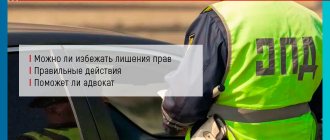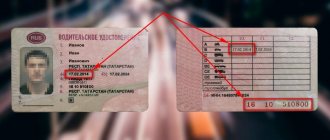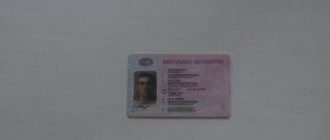How to challenge a decision on deprivation of rights? For the modern automotive community, deprivation of a driver's license to operate a vehicle for violating traffic rules is a common practice.
It applies to those drivers whose behavior on the road, the manner of driving their car and their attitude towards other road users causes a sharp public outcry and censure. This happens when there has been a gross violation of traffic rules.
However, this procedure also has a downside to the coin. Often, the results of the proceedings in a particular case by traffic police inspectors and a judge, despite the apparent impartiality and completeness of the inspection, may not always be objective.
Is it possible to challenge the deprivation of rights?
Let's start with the good - almost any protocol can be challenged. As a rule, it is compiled in conditions that are far from ideal: on the road, in a hurry, in the presence of a disgruntled driver. And since traffic police inspectors are also people, the possibility of making an error in registration is always present. All that’s left to do is find this mistake and make the most of it in court.
Even if you did not succeed in winning the case, and you were nevertheless deprived of your rights, this decision can always be challenged by filing a complaint with higher courts.
How to prepare for an appeal
If you plan to fight for your driver’s license, it is important to prepare the ground for a future dispute at the stage of drawing up the protocol.
To increase the chances of a successful appeal, do the following at the place where the protocol was drawn up:
- Collect as much data as possible from the place where you stopped : record the conversation with the inspector, photograph the readings of the instruments on the basis of which you were “charged”.
- Take and save the contacts of witnesses if it is an accident, and also do not forget to take your own photographs of the position of the car and traces of the incident (shards, treads, etc.).
- Stock up on video materials. If you have a video recorder, record information from it. If there are CCTV cameras nearby (in roadside shops, cafes, gas stations, etc.), ask for recordings.
Important! If we are talking about an accident, you can also call an independent auto expert who will make his own conclusion about the circumstances of the incident, as well as assess the amount of damage received.
The more materials you collect, the greater your chances of getting your driver's license back.
Watch the video that explains the necessary actions in case of deprivation of rights:
Related articles:
What to do to avoid deprivation of a license - tips for drivers on how to act in different cases
Deprivation of rights in case of an accident - when is it deprived and how to preserve your rights?
Conditions for appeal
In accordance with clause 1. Art. 30.1 of the Code of Administrative Offenses of the Russian Federation (CAO), a decision made by a judge can be appealed. For this procedure to be successful and you to be able to return your documents, you must meet the following conditions:
- Compliance with deadlines - file an appeal within the period established by law.
- Analysis of materials - the fact that you file a complaint that does not contain new facts will not give you anything. Therefore, it is important to carefully prepare before appealing and present to the court real reasons why you need to reconsider the case.
- Preparing evidence , without which emotions about an unfair decision and requests for review are also a waste of time.
Expert opinion
Zakharova Irina Avgustovna
Legal experience 33 years. Of these, 25 years in the prosecutor's office in the positions of Art. investigator, Art. assistant prosecutor. Since 2005, I have been representing the interests of citizens in civil courts and arbitration courts. https://www.9111.ru/urist-6835464/
According to paragraph 1 of Art. 30.3 of the Code of Administrative Offenses of the Russian Federation, a complaint against a resolution in a case of an administrative offense (including deprivation of a driver’s license) can be filed within ten days from the date of delivery or receipt of a copy of the resolution.
Thus, it is possible to appeal the court's decision on deprivation. But it is important to act correctly and taking into account all the listed conditions.
Article on the topic: Find out everything about the trial for deprivation of a driver’s license in order to prepare and win it: where, when and how the process takes place, who is involved in it
The magistrate's court deprived of rights, is it worth appealing further?
Which court revokes a driver's license? World. A person against whom an unfair decision has been made, in his opinion, has only one option left - to appeal the deprivation of a driver’s license to a higher court.
First of all, you need to know the grounds on which a driver may be deprived of the right to drive a car.
Below is a list of offenses for which rights can be deprived for a period from several months to one year:
- Driving a car that does not contain identifying license plates with state registration.
- Exceeding the maximum speed is allowed by signs and road markings in a specific area by more than 60 km/h.
- Illegal crossing of railway tracks.
- Violation of cargo transportation rules.
- Equipping your car with attributes not produced by the manufacturer.
For more serious violations such as:
- Driving a vehicle while under the influence of alcohol or drugs – driving while intoxicated.
- Refusal of examination.
- Repeated attempt to escape from the scene of a traffic accident.
You can lose your driver's license for several years, the maximum period of deprivation is 3 years.
A driver who is going to resolve the issue of returning his right to drive a vehicle in court should remember that it was the judge who made the decision to ban him.
Accordingly, a court decision to deprive a driver’s license can only be challenged at a higher authority.
Excessive claims against traffic police officers will not make any sense, since they only reflected the fact of the offense recorded by them in the relevant documents.
However, for false information, the unreliability of which was known to him in advance, an employee of the State Traffic Inspectorate is also subject to liability established for such cases by law.
Expert commentary
Selivanov Alexander Andreevich
Lawyer, specialization civil law.
Ask a question
If such violations occurred on the part of traffic police officers, then they certainly need to be proven in court. And then a positive result is guaranteed.
Possible grounds for appealing a court decision
Naturally, the driver’s reluctance to part with his license cannot be a reason for canceling the decision. To file an appeal, you need compelling reasons, for example:
- Mitigating circumstances that were not taken into account during the trial.
- Incorrect classification of the offense , according to the driver.
- Errors when preparing materials regarding a violation, if the inspector did not fill out some fields, or the document does not contain all the required signatures.
- Unreliability of information, if the protocol is drawn up on the basis of video camera recordings or readings from a device (breathalyzer or radar), can be referred to as poor quality, affecting the reliability of the information.
- The presence of evidence of the driver’s innocence , if it was discovered after the decision was made or was not taken into account by the court.
- Procedural errors that make it possible to decide that the trial was conducted in violation of legal norms. For example, the testimony of a witness that influenced the outcome of the case was not heard.
An example of appealing a court decision based on incorrect preparation of the protocol
The driver was stopped for speeding. A protocol for deprivation was drawn up, which was satisfied by the magistrate court. Immediately after the ruling was issued, the driver filed a complaint with the district court on the basis that there was no violation.
As evidence, he cited a requirement to order an additional check based on the fact that the driver was stopped at an intermediate section of the speed limit change. By the time of the meeting with the traffic police officer, he had already left the speed limit zone, which means that there was no offense.
The higher court granted the request to order an inspection. After it was carried out, the offender’s words were confirmed, on the basis of which the magistrate’s court decision on deprivation of rights was annulled.
Article on the topic: Will a court decision on deprivation of rights come into force if the driver evades receiving it?
In what cases can you count on reclassification of punishment?
According to paragraph 2 of Art. 3.8 of the Administrative Code, deprivation of rights is possible for a period of 1 month to 3 years.
Expert opinion
German Ivanovich Amvrosov
More than 25 years of legal practice in law enforcement agencies and commercial structures.
The law provides for mitigating circumstances, which, although they do not reclassify the punishment, give the court the right to apply the minimum of those specified in the article. For example, Part 4 of Article 12.15 of the Code of Administrative Offenses of the Russian Federation provides for both a fine and deprivation of VP. If there are mitigating circumstances under this rule, the court may limit itself to a fine.
Such circumstances include - Art. 4.2 Code of Administrative Offenses of the Russian Federation:
- The driver is pregnant at the time of the violation.
- The female driver has a young child.
- The offense was committed in a state of strong emotional excitement (affect) or due to a combination of difficult personal or family circumstances.
- The driver voluntarily compensated for the damage caused or voluntarily eliminated the damage caused.
- Remorse of the driver who committed the offense.
These also include the impossibility of depriving rights according to the legislative norms established in the Federal Law “On Enforcement Proceedings” dated October 2, 2007 No. 229-FZ. It regulates the possibility of restricting a driver’s license for debts (deprivation of a driver’s license for debts), including in the presence of arrears of alimony (deprivation of a driver’s license for non-payment of alimony). It also sets out the conditions under which this restriction is not allowed (clause 4 of Article 67.1 No. 229-FZ). These can be used when appealing.
But here it is necessary to distinguish between deprivation of rights as a measure of punishment for offenses and measures of restriction for enforcement proceedings. For example, a driver of an LLC may be deprived of the right to drive a vehicle for violating road safety rules. But as a debtor in enforcement proceedings, deprivation of the right to drive a vehicle does not apply to him.
Expert opinion
Zakharova Irina Avgustovna
Legal experience 33 years. Of these, 25 years in the prosecutor's office in the positions of Art. investigator, Art. assistant prosecutor. Since 2005, I have been representing the interests of citizens in civil courts and arbitration courts. https://www.9111.ru/urist-6835464/
According to clause 4 of Art. 67 Federal Law “On Enforcement Proceedings of the Russian Federation”, a temporary restriction on the debtor’s use of a special right (including the right to drive a vehicle) cannot be applied in the case of:
- if the establishment of such a restriction deprives the debtor of the main legal source of livelihood;
- if the use of a car is the only means for the debtor and his family members living with him to ensure their livelihoods, taking into account the limited transport accessibility of their place of permanent residence;
- if the debtor is disabled, or the debtor is dependent on a disabled person of group I or II or a disabled child;
- if the amount of debt under the writ of execution does not exceed 10 thousand rubles;
- if the debtor is granted a deferment or installment plan for fulfilling the requirements of the writ of execution.
In addition to those established by law, it is possible to take into account other reasons for reclassifying the punishment.
An example of appealing a court decision based on the presence of mitigating circumstances
The driver was stopped by a traffic police officer for driving into the oncoming lane. A protocol on deprivation was drawn up, which was satisfied by the magistrate's court.
The driver filed an appeal with the district court, arguing that the failure to comply with traffic rules was due to a rush due to the need to deliver his sick brother to the hospital as soon as possible.
As confirmation, the testimony of this relative was presented, as well as a medical certificate confirming the presence of the disease and the visit to the hospital on the specified day.
Taking into account the information received, the district court reviewed the case and replaced the deprivation with an administrative fine in the amount of 5 thousand rubles.
Violations in the preparation of administrative material
When considering an administrative case, the circumstances under which the driver could actually be illegally deprived of the right to drive a car are checked and clarified.
Procedural violations include:
- The information provided by the traffic police in the offense report contains inaccurate information.
- The administrative material was compiled incorrectly, in violation of the procedure established by law and the procedure for bringing a person to administrative responsibility.
- There were no witnesses, or it was impossible to establish their identities.
- The person provided evidence of his innocence to the court, but it was not taken into account.
For example, when a person appeals the deprivation of a driver’s license for refusing an examination on the grounds that he was sober. Despite this, the employees unreasonably suggested that he undergo an intoxication examination.
The driver indicated that he had no signs of intoxication, and the protocol does not contain this data, although there is a note that the driver refused to sign. The incident was filmed on video.
This is already an unreliable reflection of the facts on the part of the employee and, accordingly, the reason why the appeal can be granted.
In addition, if during the proceedings it is discovered that the traffic police inspector reflected in the protocol something that the driver did not actually do, there may be a question of disciplinary or criminal punishment for the employee who took such liberties.
Such situations occur, for example, if a driver challenges the deprivation of a driving license for being drunk, when in fact he was sober.
Procedure for appealing deprivation of rights
The appeal is carried out in the standard manner:
- An application is submitted to a higher court, which presents the grounds for review of the case. The choice of court depends on the stage of the appeal. If the first appeal is filed against the decision of the magistrate, it is sent to the district court (first judicial instance). Next, in the order of appeal, the application is submitted to the Presidium of regional courts and, lastly, to the Supreme Court of the Russian Federation.
- The higher court sets a date for a re-hearing , of which you will be notified in advance.
- A new trial is being conducted, during which the newly discovered circumstances of the case are considered.
- The judge of this instance makes a decision, which can also be appealed to a higher court if the driver has significant grounds for this.
Expert opinion
Zakharova Irina Avgustovna
Legal experience 33 years. Of these, 25 years in the prosecutor's office in the positions of Art. investigator, Art. assistant prosecutor. Since 2005, I have been representing the interests of citizens in civil courts and arbitration courts. https://www.9111.ru/urist-6835464/
In accordance with clause 1.1 of Art. 30.5 of the Code of Administrative Offenses, a complaint against a decision in a case of an administrative offense is considered by the court of appeal within two months from the date of its receipt with all the materials of the case.
Important! During the retrial, it is possible to order an additional investigation or an examination of the car.
When can you file a complaint?
The procedure for reviewing cases of administrative violations is regulated by Ch. 30 Code of Administrative Offences. In accordance with paragraph 1 of Art. 30.3 of this law, the period for appealing a court decision is 10 days from the date of receipt of a copy of the decision. If this deadline is violated, the judge has the right to reinstate it if he considers the reasons for missing to be valid.
If the petition to restore the appeal period is not satisfied, a corresponding decision is also made about this (Clause 1 of Article 30.3 of the Code of Administrative Offenses).
Time limits for consideration of complaints against a court order
The law also provides for a period within which an application for review must be considered. In accordance with paragraph 1.1 of Art. 30.5 of the Code of Administrative Offenses, a filed complaint must be considered no later than 2 months from the moment when all materials on the case were received by the court competent to consider this issue.
What documents need to be collected for an appeal?
To initiate the process, you must submit to the court:
- A correctly completed complaint is drawn up in free form, like a standard claim.
- A copy of the deprivation order that you received after the first consideration of the case.
- Documents related to the case: diagram of the accident, certificate of accident, etc.
- Motion to reinstate the appeal period if you file an appeal later than 10 days after receiving the order.
- Power of attorney if a third party is acting on your behalf.
Expert opinion
German Ivanovich Amvrosov
More than 25 years of legal practice in law enforcement agencies and commercial structures.
The Code of Administrative Offenses of the Russian Federation does not require a copy of the resolution to be attached to the complaint, but it will not be superfluous.
How to file an appeal
The complaint is drawn up in free form. It is not sent to other participants and no state duty is paid on it. The standard document consists of the following parts:
- “Hat” - in it you need to indicate the details of the judicial authority where the document is being submitted (the exact name can be taken from the deprivation order), information about the driver (full name, passport and contact information).
- Document's name . Here you need to write that this is an appeal, and also indicate information about the decision made in the first instance: name of the court, date of the decision, details of the decision on deprivation (document number).
- The main part, which includes the circumstances of stopping the driver by a traffic police officer, as well as an explanation of why he considers this decision unlawful.
- Requirements indicating a request to reconsider the case in connection with the specified circumstances and make a fairer decision with the cancellation of the deprivation of rights.
- List of attached documents in the form of a list. Here you need to take into account that during the appeal you cannot submit documents that were taken into account during the initial consideration of the case. The list should include only those evidence that was discovered after the decision was made or was not taken into account by the court in the first instance.
- Certification of the document: date and signature of the applicant (driver or his representative).
The complaint can be submitted in person or sent by registered mail. In the second case, you must additionally enclose a list of documents and a delivery receipt in the envelope, and also keep the shipping receipt.
If there are no errors in the appeal, it will be accepted by the court for consideration. The countdown of the period for consideration of the complaint begins only after registration of the acceptance of the document in the court office.
Please note that the law does not provide for the return of a complaint - Art. 30.4 Code of Administrative Offenses of the Russian Federation.
Grounds for appealing a decision to deprive a driver’s license
Many car owners, especially those who are not very well versed in the laws, consider a protocol form in the hands of a police officer on the road to be almost a death sentence. This is fundamentally wrong. Any driver must know the basics of administrative, civil and criminal regulations. It’s not necessarily that the law enforcement officer is abusing his position and wants to kill you.
Probably, the notorious human factor played a role and the road guard may, due to his own limitations or inattention, make a mistake in the document. Well, it happens, but then it will no longer be possible to punish you. It makes sense to challenge (Articles 30.1 – 30.8 of the Administrative Code) in the following cases:
- the inspector made fundamental errors in the protocol;
- The magistrate who considered your matter incorrectly interpreted the provisions of the law and missed important points;
- the car owner had one or more eyewitnesses who could tell the truth, but the judge refused to hear them;
- the device for testing alcohol levels was faulty, not ready for use, there is no information about its manufacturer (or you were not involved in such an examination at all).
You can submit a petition asking for a change in the penalty : both for a complete cancellation of the penalty, and for a reduction (usually this is what they ask for), with a request to replace it with a monetary penalty.
Providing evidence challenging a court decision
In accordance with Article 26.2 of the Code of Administrative Offenses, any data on the basis of which a judge can establish the fact of an offense, determine the guilt of a person subject to punishment, and also establish circumstances that are important for the correct resolution of the case can be recognized as evidence of an administrative offense.
In case of deprivation of rights, the following can be presented as evidence that may become the basis for review:
- Witness testimony from the stop site.
- Audio/video materials: recordings from a DVR, voice recorder, surveillance cameras, photographs from the scene of the event.
- Errors in the protocol: inaccurate data on the driver or inspector, inaccuracy in the name of the city/region and other erroneous information.
- Lack of information about the measuring instruments that were used for the examination: technical condition, manufacturer, valid certificate, data on special testing of the device.
Important! Even a small trifle can save you from becoming a pedestrian, so do not neglect any available data.
Alcohol test at the stop
At the stop site, a traffic police officer examines the driver for the presence of alcohol in his blood using special mobile devices (breathalyzers). This procedure is significantly different from a medical examination, which is carried out only by medical professionals.
The basis for the traffic police inspector’s proposal to “blow into the straw” (take a breathalyzer test) may be:
- persistent odor of alcohol from the driver;
- unstable posture;
- speech problems;
- change in skin color on the face (red spots);
- inappropriate behavior (not appropriate to the situation).
The driver will be declared drunk if the device shows 0.16 ppm or more (the amount of alcohol in the exhaled air). For example, 100 grams of vodka drunk the night before can give about 0.24 ppm in the morning. During the procedure for determining the amount of alcohol in the blood, two witnesses (witnesses) must be present.
If there is a suspicion that the driver is intoxicated, the inspector tells him how the inspection will be carried out, with what device, checks the integrity of the stamp (which certifies the proper technical condition of the device) and shows it to the driver, and also shows the verification certificate or a separate verification entry in the technical passport of the breathalyzer. If not all of the indicated actions took place, then this already indicates a violation of order. And this should definitely be used in court.
The results of the examination are entered into the report in the form described in Order of the Ministry of Internal Affairs No. 676. A separate record of the instrument readings is attached to the report, after which a copy of the document is given to the driver.
Who can appeal the decision other than the offender himself?
The driver can transfer the right to appeal a court decision to a trusted person if for some reason he cannot do this on his own. To do this, you need to issue a power of attorney and have it notarized. This document gives the right to represent the interests of the defendant in court, as well as to appeal the decision.
The role of the principal can be a car lawyer or any citizen who does not have a special education, but enjoys the trust of the defendant. The law also provides for the possibility of appealing a court decision by the prosecutor, who performs a supervisory function.
Article on the topic: Free online consultation with a car lawyer around the clock: Moscow, St. Petersburg, Nizhny Novgorod, Kazan and other regions. to a car lawyer now! + how much the services cost
Grounds for canceling the decision of the magistrate
Before filing an appeal in an administrative case in case of deprivation of a license, you need to provide compelling arguments and arguments that will help you retain your driver’s license.
Here are just some of the grounds that may be present in a complaint from a motorist or his representative.
Errors when preparing materials regarding violations
The reason for reviewing a court decision may be the traffic police inspector’s failure to comply with the required procedures when drawing up an administrative protocol.
For example, required fields may not be filled in or required signatures may be missing.
If the court deprived the driver of his license for possible drunk driving, then the appeal can refer to an incorrectly conducted medical examination process.
The practice of the Supreme Court of the Russian Federation indicates that rights are often returned on this basis.
Expiration of the statute of limitations for issuing a resolution
According to the current Russian Code of Administrative Offences, a certain time is allotted for bringing a driver to justice in the form of deprivation of rights.
Since the case is being considered by a magistrate, he has at least 3 months , calculated from the date of registration of the protocol. And if this deadline was missed by at least a day, you can keep your driver’s license.
The above applies to all offenses, except Art. 12.8, 12.24, 12.26, part 3 art. 12.27, part 2 art. 12.30 Code of Administrative Offenses of the Russian Federation. According to them, the term is 1 year , which, taking into account our judicial realities, is not so much.
Violations during the consideration of the case
In an appeal against a decision on an administrative offense, you can also refer to procedural violations on the part of the magistrate (for example, the driver was not notified of the upcoming meeting).
In addition, the basis may be an unlawful refusal to request evidence, call witnesses, or order a forensic examination.
False information
If the reason for deprivation of rights was photographs or video footage of traffic cameras, then you can complain about the low quality of the materials or their reliability.
As a result, such evidence cannot be used as the basis for imputation of an offense.
Where to submit the package of documents for appeal?
The procedure for filing a complaint is regulated by Art. 30.2 Code of Administrative Offences. In accordance with paragraph 1 of this law, an appeal is filed with the court that issued the original deprivation decision. It will be registered by the secretary, and a copy of the complaint will be returned to you with a note of acceptance (full name and position of the person who accepted the document, as well as the date of acceptance).
The appeal will be sent to a higher court within 3 days from the moment of its registration (Clause 1 of Article 30.2 of the Administrative Code). Since the issue of deprivation of rights is considered in the magistrate's court, the appeal, as a rule, is sent to the district court of the same district.
To monitor the appeal process, call the court to which your application must be sent and check to see if they have received it. You can also independently transfer materials for appeal to a higher judicial authority, bypassing the court of first instance (clause 3 of Article 30.2 of the Administrative Code).
Important! According to paragraph 5 of Art. 30.2 of the Administrative Code, a complaint against a court decision on an administrative offense is not subject to state duty.
Violations during consideration of an administrative case in court
Of course, one article cannot cover all the possible violations that courts commit when considering administrative cases. At the same time, from the current practice we can conclude that the courts work like a carbon copy.
Grounds on which it is possible to cancel a decision when considering a case in a magistrate’s court:
- Prejudicial attitude of the court itself towards the driver.
- Ignoring on the part of the judge of reliable facts presented by a person during the trial.
- Incorrect interpretation of the driver's position in the final decision on deprivation of rights.
- Violation of the right to defense, refusal to demand evidence or to call witnesses.
- Consideration of a case in the absence of a person, without evidence of his proper notification.
The above, with a skillful and competent approach, can contribute and lead to the cancellation of a decision in a case of an administrative offense. This means that the driver will remain with his license. For many, this is vitally important due to their professional activities.
Which complaint to file immediately - cassation or appeal? The procedure for appealing court decisions
First, you need to define the difference between these two types of complaints. The appeal implies that the case will be re-examined taking into account newly discovered circumstances. Thus, the validity and legality of the decision made by the court of first instance is checked.
As for the cassation appeal, it consists of checking the legality and contestability of the court decision. It turns out that this is a check of how much the trial court complied with all procedural norms. You can also file a cassation appeal if you consider deprivation to be too severe a punishment for your offense, and the court of first instance did not satisfy the appeal.
Thus, if you want to appeal the deprivation of your driver's license, you must first write an appeal and only then contact higher authorities.
An example of a sequential appeal of a court decision
Driver K. was stopped by traffic police for driving into the oncoming lane. The inspector issued a report on deprivation, which was satisfied by the magistrate's court.
Driver K. filed an appeal to the district court, in which he argued that the traffic violation was forced, and offered to listen to a witness who could confirm this fact.
In addition, he presented evidence of mitigating circumstances - he committed the offense in a state of strong emotional excitement (his father died on that day).
The district court did not accept the new circumstances in the case and left the magistrate's decision unchanged.
Then driver K. appealed to the regional court with a cassation, in which he indicated the circumstances under which the traffic rules were violated, as well as the violation of procedural norms by the court of first instance, which was expressed in the fact that witness testimony was not heard.
The applicant also attached a certificate from his place of work, a statement from a passenger confirming that the violation of the rules was related to a rush (they were going to the airport and were late for the plane) and a copy of the air ticket. After reconsidering the case, the complaint was upheld and the deprivation was replaced by an administrative fine in the amount of 5 thousand rubles.
Appeal at first instance - appeal
This is the first stage of appeal, where it must be taken into account that the deprivation order begins to take effect after the expiration of the period established for its appeal. In this case, it is 10 days from the date of the decision.
It is during this period that you can file an appeal and seek a review of your deprivation issue in the court of first instance. Initiation of the appeal procedure stops the period for the decision to enter into force until a decision is made on the submitted petition.
All this time you can use the vehicle (VV) without restrictions.
Thus, this type of complaint is filed against court decisions that have not yet entered into legal force. As a result of the review, one of the following decisions may be made:
- The original decision remains unchanged, and the complaint is not satisfied. This means that your driver's license will be revoked.
- On changing the resolution, if this does not increase the administrative punishment or otherwise worsen the position of the person in respect of whom the resolution was made.
- A new decision is made, if the driver is not satisfied with it, it can also be appealed later.
- On the cancellation of the decision and on the termination of proceedings in the case, as well as in the absence of proof of the circumstances on the basis of which the decision was made.
- The case is again transferred to the magistrate's court after examining the complaint by a higher authority. There it is reviewed again taking into account new circumstances. In this case, reclassification of the punishment is possible.
- The case is sent for consideration according to jurisdiction if, during the consideration of the complaint, it is established that the decision was made by an unauthorized judge, body, or official.
It is important to take into account that the period of deprivation of rights begins to be calculated from the moment the driver’s license is handed over to the traffic police. And since it will take at least a month to consider the appeal, if a negative decision is made on your issue, it turns out that you yourself are extending the period for which you will be in the status of a pedestrian. This is why it is important to only appeal if you are sure you have sufficient grounds to do so.
An example of deferring the start of execution of a sentence due to an appeal
By a decision of the Magistrate's Court dated March 22, 2016, citizen N. was deprived of the right to drive a vehicle for 14 months for driving into the oncoming lane. On March 25, 2016, he filed an appeal with the district court and tried to appeal this decision on the basis of incorrect classification of the offense.
He argued that driving into oncoming traffic was the end of the maneuver and required a review of the cases. As a result of an additional investigation, it was decided to leave the decision of the trial court unchanged.
This decision came into force immediately after its adoption on May 13, 2016. Taking into account the period of consideration of the appeal, as well as the time spent on additional investigation and re-trial, the period for calculating the deprivation of rights was suspended for almost 2 months.
Article on the topic: Duration of deprivation of a driver's license - when the execution of the punishment begins and what is an interruption in the calculation of terms
Appeal in the second instance - cassation
This type of complaint can be filed within six months from the date of the last consideration of the issue. The cassation appeal is sent to the Supreme Court of the constituent entity of the Russian Federation, for example, to the Presidium of the regional court.
The statement also requires indicating exactly how legal norms were violated during the consideration of the case. It is necessary to support the instructions with arguments confirming them. The cassation is submitted according to the number of participants in the process (a separate copy is made for each of them).
The following must be attached to the complaint:
- A decision of a magistrate made in a case of an administrative offense.
- A copy of the appeal ruling based on the results of consideration of the complaint, if such a decision was made.
- A copy of the document that certifies the powers of the legal representative of the offender, a copy of the power of attorney or an order issued by the relevant legal entity that certifies the powers of the defense lawyer or representative, if the complaint is signed by these persons.
- Copies of the complaint, the number of which corresponds to the number of other participants in the proceedings.
Each document must have a blue stamp confirming its validity and relevance.
The received complaint is submitted for consideration to a judge of a higher authority, who alone makes a decision on whether to accept the application or refuse it.
Important! The percentage of refusals to accept cassation appeals is quite high. Therefore, if your application is accepted, the chance of a decision in your favor increases significantly.
Appeal in third instance - supervisory complaint
The supervisory authority is the Supreme Court of the Russian Federation, where the complaint is sent directly by the driver himself or his legal representative. The basis for an appeal may be violations of a procedural nature committed during the consideration of the case by the courts of first and second instance.
The deadline for filing a complaint is 1 year from the date of the decision to reconsider the case.
Important! When appealing at this stage, the issue of the entry into force of the decision of the previous instance does not matter.
The complaint is drawn up in a standard manner, detailing the grounds for re-examining the case and providing supporting facts. Copies of decisions made on your issue earlier must be attached to the document.
The time for consideration of a complaint by a supervisory authority is no more than 1 month. The decision is made by the judge based on the reasons you presented in your application. According to the law, it is allowed to check the case in full in a supervisory manner, but in reality this rarely happens.
Often this authority is the last hope of citizens who are convinced that the ruling is unfair. There are actually many cases when the Supreme Court returns rights, so if appealing the deprivation by other means fails, an appeal to a higher court is justified.
Why can a driver lose his right to drive a car?
According to the current legislation on administrative offenses, there are many reasons for a driver to be deprived of the opportunity to drive a car.
This includes driving with fake license plates or without them at all, and repeatedly speeding. Violation of the procedure for installing specific sound and light signals on the machine.
However, in most cases, drivers are punished on suspicion of driving while intoxicated. In this case, the basis for drawing up a protocol on an administrative offense will be the alcohol test data.
At the same time, the motorist should be aware that the permissible reading of the device is 0.16 mg per liter of exhaled air. And if the device showed lower numbers, then there is no reason to take away the driver’s license.
However, no matter what the reason for the described trouble, you still need to start appealing the court’s decision to revoke your driver’s license.
It is necessary for at least two reasons:
- Rights can be taken away for even one year.
- In order to return them, you will have to take the traffic rules exam again.
Is it possible to implement the plan in practice? Yes, provided that there are objective grounds for canceling the decision.
What to do if appealing decisions in all instances did not give a positive result
If appealing to the courts of all three instances does not give a positive result, you will be deprived of your driver's license for the period specified in the last decision. In this case, you will have to hand over your plastic card to the traffic police department and put the car in a garage or parking lot before the expiration of the deprivation period.
If you fail to appeal the decision, you can try to file a petition for non-deprivation. This is possible if, in addition to deprivation, another type of punishment is provided for this offense (for example, a fine). If the use of other measures in this case is impossible (for example, paragraph 3 of Article 12.10 of the Code of Administrative Offences), filing a petition can help reduce the period of deprivation to a minimum.
The application is sent to higher authorities. So, if all three types of complaints have already been filed, then this petition for non-deprivation or mitigation of punishment is submitted to the Supreme Court of the Russian Federation.
Article on the topic: Responsibility for driving without a license after deprivation - analysis of specific situations + what to do if you are stopped and don’t have a license
How can you protect yourself?
You can increase your chances of success when it is necessary to overturn a court order to revoke your driver's license by following these recommendations.
- You need to thoroughly know the traffic rules and the Code of Administrative Offenses of the Russian Federation in this area, no less than at a basic level. An appeal to a higher authority should not be based only on personal conviction that the traffic police and the court are wrong.
- In an appeal against a decision, all circumstances are indicated in as much detail as possible and in a light favorable to oneself. When drafting, it should be taken into account that the more competently the events are presented, the more favorable the impression it will make on the judge.
- During the trial, show restraint, operate with facts and not give in to negative emotions.
- Advisory and practical assistance from a car lawyer will guarantee compliance with your rights in court.
By following our advice, there is a chance to stay with a driver's license.
Author: Oleg Vladimirovich Roslyakov, source.
Let's sum it up
So, the options for appealing a decision on deprivation of rights and the features of the procedure are as follows:
- Filing an appeal to the district court within 10 days from the date of the decision by the magistrate.
- Filing a cassation appeal to a regional court or the Supreme Court of a constituent entity of the Russian Federation within six months after an unsuccessful attempt to appeal in the first instance.
- Filing a supervisory appeal to the Supreme Court of the Russian Federation within 1 year from the issuance of the last decision, if other methods of challenging the court decision have failed.
- If you missed the appeal deadline , it may be reinstated . The decision is made by the court hearing the case.
- When appealing, you only need to indicate additional circumstances that confirm the possibility of reclassifying the punishment or its cancellation.
- Preparation for an appeal should begin from the moment you meet with the inspector ; any little thing that you record can help avoid deprivation.
In what cases can you count on reclassification of punishment?
According to the provisions of the Code of Administrative Offenses of the Russian Federation, the defendant or his representative may apply for reclassification of the administrative penalty.
The maximum period of deprivation of rights is 3 years, but even with such a sentence, under the influence of a number of circumstances, it is possible to replace the punishment with a fine. Mitigating factors include the following:
- the driver was pregnant at the time the offense was committed;
- the presence of a mental disorder in the defendant if there is documentary evidence;
- car breakdown, which became the provocateur of traffic violations.
Situations where deprivation of rights is contrary to the law are considered separately. This includes cases of temporary suspension of the VU of a citizen who has alimony debts.
How to achieve justice more effectively?
When filing an appeal, be sure to remember some ways in which you can significantly increase the likelihood of a successful hearing in a higher court:
- Do not refuse the services of experienced lawyers and attorneys. This greatly increases the likelihood of a successful consideration of the case, even at the first stage of drawing up an appeal. Lawyers' fees can then be recovered from the defendant upon settlement of the complaint. It is best to seek the help of lawyers who specialize specifically in investigating the circumstances of road accidents;
- Do not refuse to conduct additional examinations. At the same time, sometimes it is important not only to make a new examination, but also to check the accuracy of previous studies. It is possible that this is precisely the detail that will help radically change the court’s attitude to the essence of the case;
- When considering a case in a higher court, you should not neglect the testimony of witnesses, even if they have already given their testimony last time. Perhaps another judge will have new questions for them that will greatly change the court’s attitude to the circumstances of the accident.
When drawing up a complaint, you should include quotes from the court decision and counterarguments, which may include references to various regulatory documents and federal laws. And if only part of the court decision is disputed, then you should be prepared for the fact that the higher court will review the previous decision only partially, to the extent that will help shed more light on this particular side of the court decision.
sample appeal in a road accident case
How to write an appeal correctly?
There are a number of mandatory requirements for filing an appeal against a court decision. A sample appeal to a higher judicial authority can be downloaded from the link at the end of the article. What must this document contain?
- Title. It is located in the upper right corner and contains information about the judicial authority (including its address), as well as a number of personal information about the applicant (full name or name of a legal entity, address, telephone);
- Main part. It is written under the title of the document (for example, “Appeal for a road accident”). It describes the essence of the case and the appealed decision of the lower court, the date of the decision and its number, the name of the judge who announced the verdict. Next, a specific requirement is indicated - to cancel the decision of the lower court in its entirety or to revise it in any part. As arguments for his innocence, the plaintiff cites only the evidence that he has already used previously;
- Final part. Contains a list of documents attached to the complaint, as well as the signature of the plaintiff, the date of preparation of the document and the seal (if the plaintiff is a legal entity).
An appeal is permitted to express a demand for review of only one specific court decision.
The complaint is written in a formal business style, and instead of personal pronouns (I, we, he, they), the legal terms “Plaintiff”, “Applicant”, “Respondent” should be used. Along with the appeal, a number of documents are sent to the higher court, including a copy of the previous court decision, a copy of the receipt for payment of the state fee and a check for sending a copy of the appeal to all participants in the trial.
In what cases is an appeal filed?
An exhaustive list of situations in which the plaintiff is allowed to file an appeal against a court decision is given in paragraph 1 of Article 330 of the Civil Procedure Code of the Russian Federation:
- the circumstances of the case were not determined correctly by the court;
- the court did not prove the established circumstances that are of great importance for the case;
- the conclusions of the lower court, set out in its decision, do not correspond to the circumstances of the case;
- rules of substantive or procedural law were violated or used incorrectly.
In addition, in accordance with paragraph 4 of Article 330 of the Code of Civil Procedure of the Russian Federation, court decisions must be canceled in any case if:
- the case was considered by a composition of judges that contradicted the norms of law;
- during the consideration of the case, the persons who were supposed to participate in it were absent and were not properly notified of the time and place of the court hearings;
- the rule regarding the language in which the court hearing was conducted was violated;
- the court in its decision determined the rights and obligations of persons who did not participate in the case;
- the court decision was not signed by the judge at all or was signed by a different judge(s) who participated in the case;
- the minutes of the court hearing are not attached to the case;
- the secrecy of the meeting of judges or their decision-making was violated.
Often, only a competent lawyer can determine that certain points given above were violated during court hearings. Therefore, it is best to obtain full legal advice before filing an appeal (if a lawyer has not been hired at the initial stage of the case).
What may be the outcome of filing a complaint?
Based on the results of consideration of an appeal regarding an accident in a higher court, one of the following decisions may be made:
- the previous court decision remains in force, and the plaintiff’s complaint is not satisfied;
- a new resolution is adopted on the road accident case (completely new or only in some parts);
- the previous decision is canceled in whole or in part;
- the appeal remains without consideration at all (if the procedure for filing it is violated, for example, the deadline of 1 month has expired);
- the paperwork in the case is completely terminated.
If the decision on the appeal does not satisfy the appellant, then he has the right to appeal to a court of an even higher instance to review the case.








